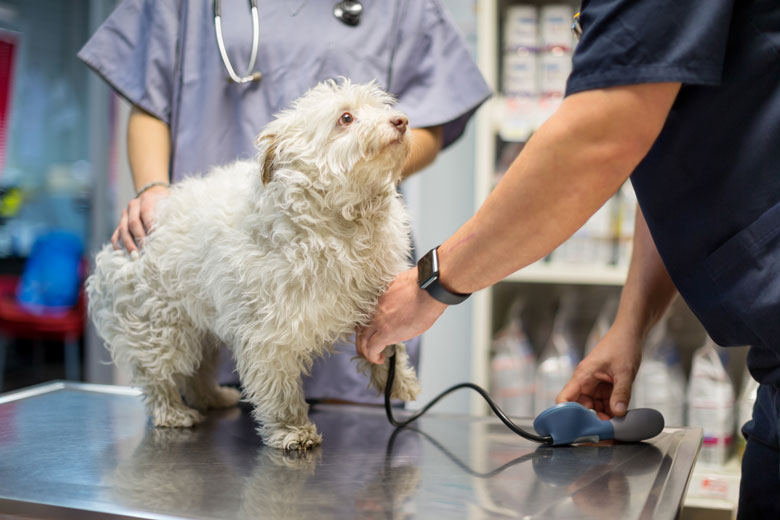High Blood Pressure in Dogs

Blood pressure is how much pressure is applied to the walls of the arteries when the heart pumps and relaxes. In dogs, as in people, there is a normal blood pressure, and high blood pressure can indicate and cause health problems.
Blood Pressure in Dogs
The greatest amount of pressure is applied to artery walls when the heart contracts, and that measurement is the systolic pressure.
When the heart relaxes, there is less pressure on the arterial walls, and that measurement is called diastolic pressure.
A dog's blood pressure can be taken in a way that's pretty similar to how a human's is taken. A cuff is placed around the dog's lower leg, over the big artery there. Then, either a veterinarian will listen through a stethoscope while the cuff is inflated and deflated or a machine will take the measurement.
Diastolic pressure, which is the bottom number of a blood pressure result, is not nearly as reliable to measure in dogs as it is in humans.
Blood pressure results that are consistently higher than 140/90 are considered high blood pressure in dogs.
Stress can cause high blood pressure readings, and that's even more commonly a cause of high blood pressure in dogs than in humans. Blood pressure readings should be taken in as calm a manner and place as possible, and the veterinarian or staff will probably take several measurements to compare them.
What Causes High Blood Pressure in Dogs?
When blood pressure is consistently high but there is no other illness present, it's called primary hypertension. This is a rare condition in dogs.
Blood pressure can be high because of another condition, which is called secondary hypertension, and that's the most common type in dogs, especially older ones. Some conditions that often cause secondary hypertension in dogs include:
- Kidney disease*
- Kidney infection
- Cushing's disease
- Heart disease
- Diabetes mellitus
*Kidney disease can also be caused by high blood pressure
What Are the Signs of High Blood Pressure in Dogs?
Signs of hypertension in dogs may be non-existent. However, some dogs may show signs that can include the following:
- Detached retinas
- Sudden blindness
- Nose bleeds
- Seizures or other neurological signs, like circling or head pressing, from a bleed in the brain
- Weakness
- Partial paralysis
- Nystagmus (rapid involuntary movements of the eyes back and forth)
- Blood in the urine
- Heart murmurs and arrythmias
Dogs with hypertension that is secondary to another condition may also show signs of the primary condition, such as increased drinking and urination in dogs with kidney disease.
How Is High Blood Pressure in Dogs Treated?
If an underlying cause for the hypertension is identified, that will need to be treated aggressively, and the treatments vary by condition.
Medications to treat the high blood pressure itself can include:
- ACE inhibitors
- Beta blockers
- Diuretics
- Angiotensin II receptor antagonists
- Calcium channel blockers
Blood pressure response is monitored, and medications are added or adjusted as needed.
Treatment is usually required for the life of the dog, along with close monitoring to avoid potential bad outcomes of hypertension such as blindness, stroke, or kidney failure.
You May Also Like These Articles:
Are Grain-Free Diets for Dogs Dangerous?
Disclaimer: This website is not intended to replace professional consultation, diagnosis, or treatment by a licensed veterinarian. If you require any veterinary related advice, contact your veterinarian promptly. Information at DogHealth.com is exclusively of a general reference nature. Do not disregard veterinary advice or delay treatment as a result of accessing information at this site. Just Answer is an external service not affiliated with DogHealth.com.
Notice: Ask-a-Vet is an affiliated service for those who wish to speak with a veterinary professional about their pet's specific condition. Initially, a bot will ask questions to determine the general nature of your concern. Then, you will be transferred to a human. There is a charge for the service if you choose to connect to a veterinarian. Ask-a-Vet is not manned by the staff or owners of DogHealth.com, and the advice given should not delay or replace a visit to your veterinarian.



